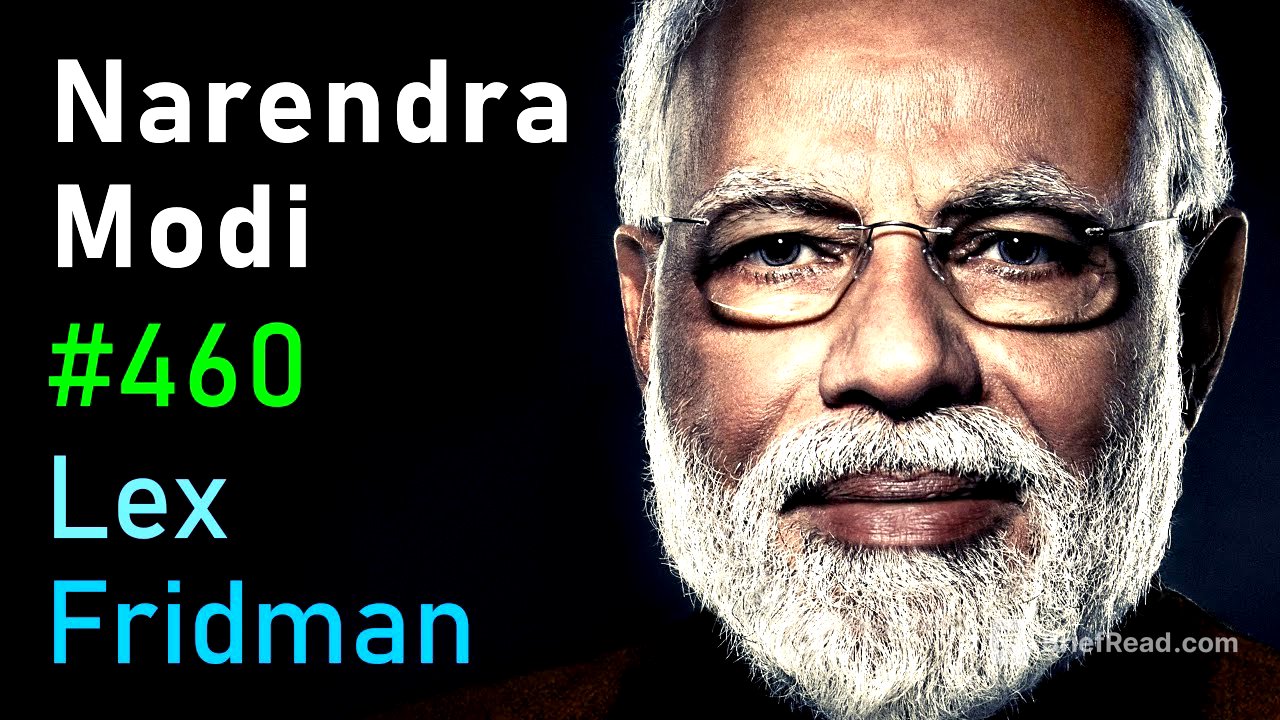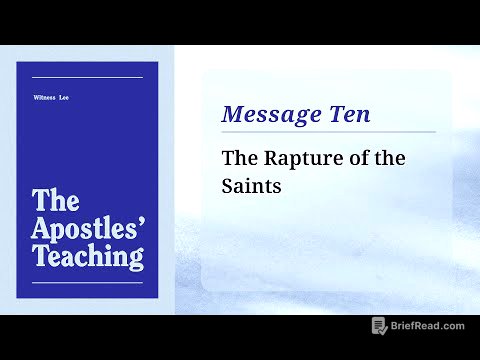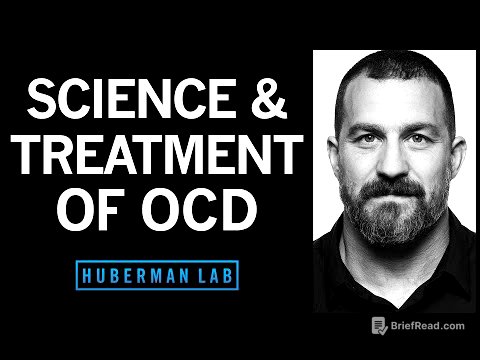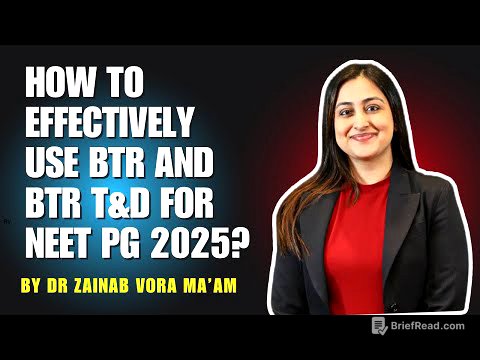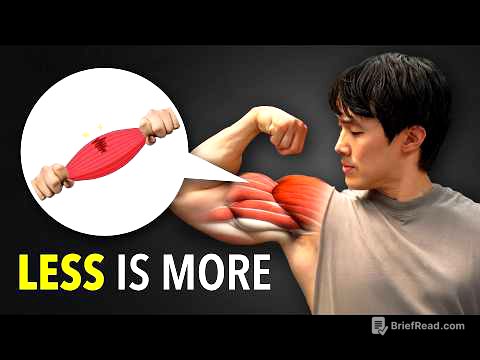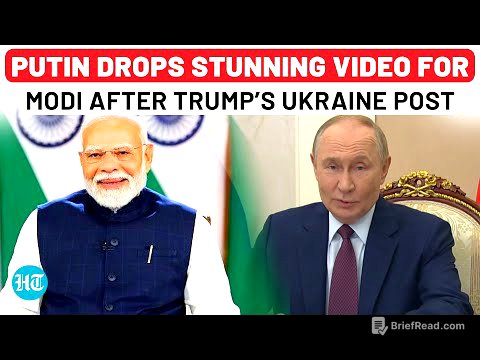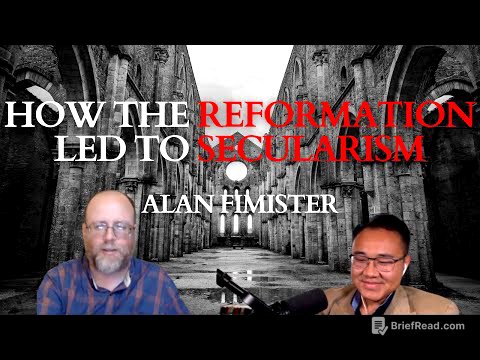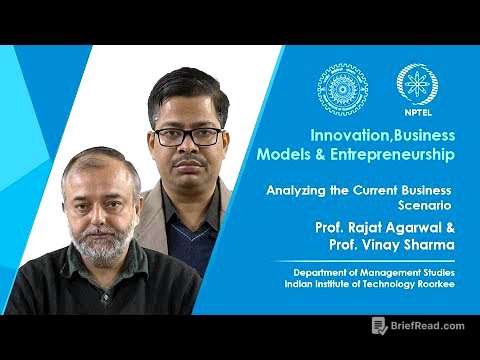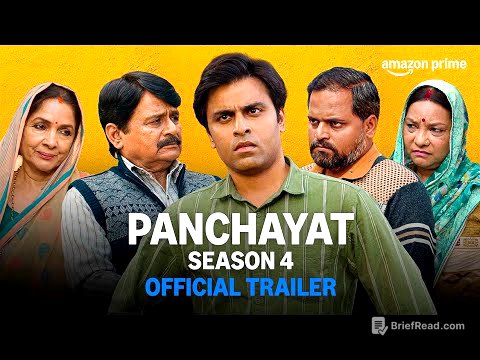TLDR;
This episode of the Lex Fridman Podcast features a conversation with Narendra Modi, the Prime Minister of India. Modi shares insights into his life, from his humble beginnings to his role on the world stage, discussing topics such as fasting, spirituality, advice to young people, geopolitics, and the future of India. Key takeaways include the importance of peace, hard work, continuous learning, and serving others.
- Importance of peace and harmony in a conflict-ridden world.
- The value of hard work, discipline, and continuous learning.
- India's cultural identity and its role in global cooperation.
In this episode... [0:00]
The video opens with Prime Minister Modi emphasising that his strength comes from the 1.4 billion Indians he represents and their rich cultural heritage. He asserts India's commitment to peace, rooted in the teachings of Buddha and Mahatma Gandhi, and its willingness to act as a peacemaker on the global stage. Modi also touches upon his early life, marked by extreme poverty, and his efforts to foster peace with Pakistan, which were unfortunately met with hostility. He concludes by welcoming criticism as the soul of democracy and encouraging young people to remain patient and confident, even in the face of adversity.
Introduction [3:07]
Lex Fridman introduces Narendra Modi, highlighting his incredible journey from poverty to leading the world's largest democracy. He emphasises Modi's role as a unifying figure in a diverse nation and his respected position as a peacemaker on the global stage. Fridman expresses his admiration for Modi's ability to build bridges and celebrate common humanity, noting the conversation as one of the most remarkable he has ever had. He clarifies that his respect is for Modi as a human being, characterised by empathy, kindness, and focus, rather than an idolisation of power. Fridman also mentions the availability of the podcast in multiple languages, including Hindi and English, to ensure accessibility for a global audience.
Fasting [9:19]
Lex Fridman begins a discussion on fasting, mentioning his own 45-hour fast in honour of the conversation. Prime Minister Modi explains that fasting is a way of life in India, deeply rooted in religious traditions and aimed at elevating the body, mind, intellect, soul, and humanity. He describes fasting as a tool to cultivate discipline and balance the inner and outer self, sharpening the senses and accelerating the thinking process. Modi clarifies that fasting is a scientific process that involves preparing the body in advance through Ayurvedic practices and yoga. He shares his personal experience of fasting since childhood, inspired by Mahatma Gandhi's vision of cow protection, and how it has transformed his awareness and energy levels.
Early life [21:38]
Lex Fridman transitions to Narendra Modi's early life, highlighting his humble beginnings in a one-room house with a mud floor. Modi shares details about his birthplace, Vadnagar in Gujarat, a town with rich historical significance. He recounts how his village instilled in him a sense of history and cultural heritage, with discoveries dating back 2,800 years. Modi speaks fondly of his family, particularly his hardworking parents, and how they shielded him from feeling the burden of poverty. He shares anecdotes about his resourcefulness, such as polishing his canvas shoes with chalk, and his mother's spirit of caring for others.
Advice to Young People [33:33]
Lex Fridman asks Narendra Modi for advice to young people who are struggling and trying to find their way. Modi advises patience and self-confidence, emphasising that challenges are opportunities for growth. He cautions against shortcuts, stressing the importance of perseverance and pouring one's heart into every responsibility. Modi encourages young people to focus on "doing" rather than just "becoming," and to always keep the desire to learn alive. He concludes by highlighting the importance of giving back to society and finding contentment in contributing to the well-being of others.
Journey in the Himalayas [39:16]
Lex Fridman inquires about Narendra Modi's two years spent roaming in the Himalayas at the age of 17, seeking purpose and deeper truth. Modi shares that he doesn't usually talk much about this period, but shares some external aspects of it. He recounts his early experiments with testing his body's limits, such as sleeping outside in the cold. Modi speaks of his inspiration from Swami Vivekananda and his desire to shape his life like the figures he read about. He shares an anecdote about serving a saint during Navratri instead of attending his aunt's wedding, illustrating his early inclination towards service and spirituality.
Becoming a monk [50:45]
Lex Fridman discusses Narendra Modi's time at the Ramakrishna Mission ashram and the influence of Swami Atmasthananda, who steered him towards a life of service. He notes the possibility of Modi taking sanyasa and becoming a monk, contrasting it with his path as a prime minister. Modi responds that, despite his role as a leader, he maintains an unwavering spiritual commitment. He sees no real difference between a saint and a leader, as both are dedicated to serving others with calm focus and dedication.
RSS and Hindu nationalism [52:33]
Lex Fridman brings up Narendra Modi's lifelong commitment to putting India first and his early involvement with the RSS, which espouses Hindu nationalism. Modi recounts joining the RSS at a young age, drawn by patriotic songs and the organisation's emphasis on serving the nation. He highlights the RSS's core values of purpose-driven action and selfless service, citing examples of volunteer-led initiatives in social service, tribal welfare, and education. Modi emphasises the RSS's focus on uniting the world through workers, representing a shift from leftist ideologies.
Explaining India [1:00:17]
Lex Fridman asks Narendra Modi about the unifying idea of India, given its diverse cultures and communities. Modi explains that India is a cultural identity and a civilization dating back thousands of years. He acknowledges the vastness and diversity of India, with its numerous languages, customs, and clothing styles. However, he emphasises the common threads that unite the nation, such as the stories of Lord Ram and the tradition of remembering all the rivers of India during bathing rituals. Modi contrasts this cultural unity with the Western view of nations as merely administrative systems.
Mahatma Gandhi [1:04:27]
Lex Fridman acknowledges Mahatma Gandhi as one of the most important figures in India's history, alongside Narendra Modi himself. He asks Modi what he admires about Gandhi. Modi highlights Gandhi's deep sense of duty, his commitment to his principles, and his ability to awaken a nation and lead a mass movement fueled by truth. He recounts Gandhi's efforts to include every segment of society in the freedom struggle, transforming the common man into a soldier. Modi shares anecdotes about Gandhi's life, such as his meeting with King George in a breechcloth, and how his call for unity and recognition of the people's strength still resonates with him.
Path to peace in Ukraine [1:16:23]
Lex Fridman acknowledges Narendra Modi's skill in geopolitics and his potential to be a peacemaker on the world stage, particularly in the Russia-Ukraine conflict. Modi emphasises that India is the land of Buddha and Gandhi, whose teachings are dedicated to peace. He states that India's cultural and historical background gives its voice weight when speaking of peace. Modi shares that he has close relationships with both Russia and Ukraine and can convey the message that resolution will only come through negotiation. He stresses that he stands for peace and strives for it.
India and Pakistan [1:19:37]
Lex Fridman shifts the focus to the tense conflict between India and Pakistan, two nuclear powers with strong ideological differences. He asks Narendra Modi about the path to friendship and peace between the two nations. Modi recounts the shared struggle for independence before 1947 and the subsequent partition, which led to bloodshed. He accuses Pakistan of waging a proxy war against India and fostering a terrorist mindset. Modi expresses hope that wisdom will prevail and that Pakistan will choose the path of peace, noting that even the people of Pakistan long for it.
Cricket and Football [1:25:16]
Lex Fridman transitions to lighter topics, asking Narendra Modi about the better cricket team between India and Pakistan and the role of sports in fostering better relations. Modi emphasises the power of sports to energise the world and bring people together across nations. He avoids declaring a superior team, stating that the results speak for themselves. Fridman then asks about the greatest football player of all time, prompting Modi to mention Maradona for the older generation and Messi for the current generation. Modi shares a story about a village in Madhya Pradesh known as "Mini Brazil" due to its dedication to football.
Donald Trump [1:29:41]
Lex Fridman inquires about Narendra Modi's friendship with Donald Trump, asking what he likes about him as a friend and leader. Modi recounts an event in Houston, "Howdy Modi," where Trump showed humility by sitting in the audience while Modi spoke. He shares an anecdote about Trump's willingness to walk with him into a crowd, demonstrating courage and trust. Modi admires Trump's "America First" spirit, which resonates with his own "Nation First" belief. He also recalls his first meeting with Trump at the White House, where Trump broke protocol and personally gave him a tour.
China and Xi Jinping [1:40:51]
Lex Fridman asks Narendra Modi about reinvigorating his friendship with Xi Jinping to de-escalate tensions and resume cooperation with China. Modi states that the relationship between India and China is ancient, with both nations learning from each other for centuries. He notes that there is no real history of conflict between them. Modi acknowledges the border disputes and tensions in 2020 but mentions that after his recent meeting with President Xi, there has been a return to normalcy at the border. He emphasises the importance of dialogue and cooperation for global stability and prosperity.
Gujarat riots in 2002 [1:47:56]
Lex Fridman brings up the 2002 Gujarat riots, one of the most challenging periods in modern Indian history, when there was violence between Hindu and Muslim citizens of the Gujarat. He asks Modi, who was Chief Minister of Gujarat at the time, what lessons he draws from that time. Modi provides context by outlining the series of global terrorist attacks that preceded the riots, creating a tense environment. He emphasises that the judiciary thoroughly investigated the matter and found him completely innocent. Modi highlights that after 2002, Gujarat has remained peaceful, shifting away from vote-bank politics to a focus on development and trust.
Biggest democracy in the world [2:03:33]
Lex Fridman asks Narendra Modi about his relationship with criticism, particularly regarding the 2002 Gujarat riots. Modi welcomes criticism as the soul of democracy, emphasising the importance of genuine, well-informed criticism for improvement. He distinguishes between allegations and criticism, stating that allegations cause unnecessary conflicts. Modi shares an analogy about journalism being like a bee, collecting nectar and sharing sweetness, but also capable of stinging powerfully when necessary.
Power [2:13:48]
Lex Fridman transitions to the topic of democracy, noting that Narendra Modi has won eight elections and represents 1.4 billion people in the world's biggest democracy. He asks what it takes to win an election like that and whether Modi ever thinks about the corrupting effect of power. Modi responds that he sees himself as a humble servant, not a powerful leader. He states that he entered politics to serve, not to play power games, and that his governance is rooted in the people, not the polls. Modi emphasises his lack of conflicts of interest and the dedication of his party's volunteers.
Hard work [2:18:34]
Lex Fridman notes that Narendra Modi is known as one of the hardest workers, putting in crazy hours every day. He asks about Modi's philosophy behind that and his source of strength and perseverance. Modi responds that he doesn't believe he's the only one working hard, citing farmers, soldiers, laborers, and mothers as examples. He states that his responsibilities keep pushing him forward and that he made a promise to his fellow citizens to never fall behind in hard work, never act with bad intentions, and never do anything for personal gain.
Srinivasa Ramanujan [2:21:42]
Lex Fridman, as an engineer and lover of mathematics, asks about Srinivasa Ramanujan, an Indian mathematician considered one of the greatest of all time. He asks what Modi finds inspiring about him. Modi expresses deep respect for Ramanujan, highlighting the connection between science and spirituality. He recounts Ramanujan's belief that his mathematical ideas came from the goddess he worshipped, emphasising the importance of spiritual discipline and devotion. Modi stresses the difference between information and knowledge, stating that knowledge evolves through processing, reflection, and understanding.
Decision-making process [2:23:48]
Lex Fridman asks Narendra Modi about his decision-making process, particularly when facing high-stakes choices with uncertainty. Modi outlines several factors, including his extensive travel across India, his lack of baggage, his focus on the country's interests, and Mahatma Gandhi's advice to think of the poorest person. He emphasises his well-connectedness, his learner's mindset, and his willingness to play devil's advocate. Modi shares an example of his decision-making during COVID, where he resisted global theories and focused on the unique conditions of India.
AI [2:31:35]
Lex Fridman references Narendra Modi's speech on AI at the AI Summit in France and asks how India can become a leader in the space, given its talent pool. Modi states that AI will remain incomplete without India, emphasising the importance of collaboration. He highlights India's work on AI-driven applications and its efforts to ensure GPU access for all. Modi notes that India has access to an extraordinarily vast pool of talent, which is its greatest strength. He also acknowledges the success of Indian-origin tech leaders in the US and the cultural values that contribute to their success.
Education [2:41:50]
Lex Fridman asks Narendra Modi about the "Pariksha Pe Charcha," where he interacts with students and gives advice on exams. Modi explains that a strange mindset has developed in society, with schools and families measuring success by students' rankings, leading to increased pressure on children. He emphasises the importance of exams for assessing knowledge but cautions against them becoming the sole measure of potential. Modi shares anecdotes about innovative learning techniques from his own school days and highlights the changes introduced in the new education policy.
Learning and focus [2:52:06]
Lex Fridman asks Narendra Modi for advice on how to learn best, not just when young but throughout life. Modi shares that he learns by being fully present in the moment, giving his full attention to the person he's with. He emphasises the importance of immersing oneself in the flow of practice and daring to take risks. Modi states that those who live in the present live life to the fullest, as every moment lived has already slipped into the past.
Mantra [2:57:56]
Lex Fridman asks Narendra Modi to guide him through a Hindu prayer or meditation. He mentions learning the Gayatri Mantra and attempts to chant it. Modi praises his effort and chants the mantra himself, explaining that it is dedicated to the radiant power of the Sun and is a powerful tool for spiritual enlightenment.
Meditation [2:59:41]
Lex Fridman asks Narendra Modi about the role of mantras in his spirituality and what his mind goes to in quiet moments. Modi explains that meditation, or "Dhyaan," simply means freeing oneself from distraction. He shares an anecdote from his time in the Himalayas, where a sage taught him to focus on the rhythmic sounds of water droplets falling onto a bowl. Modi states that this practice evolved into meditation and helped him learn the art of concentration. He quotes mantras that emphasise universal well-being and peace.
Lex visiting India [3:05:38]
Lex Fridman thanks Narendra Modi for the conversation and the honor of welcoming him to India. Modi recommends easing into eating slowly after fasting and hopes that Fridman reaps great benefits from the experience. He expresses gratitude for the opportunity to explore new realms of thought and hopes that his viewers enjoy the conversation.
Siddhartha [3:10:04]
Lex Fridman reflects on the conversation and shares his experiences traveling around Delhi and India. He mentions the kindness of the people and the expressiveness of their eyes and faces. Fridman also comments on the chaotic traffic and his plans to travel around India with friends in the near future. He concludes by discussing the book "Siddhartha" by Herman Hesse, which first drew him toward India and its philosophical traditions. Fridman shares two key lessons from the book: the illusion of time and the importance of forging one's own path through direct experience.
